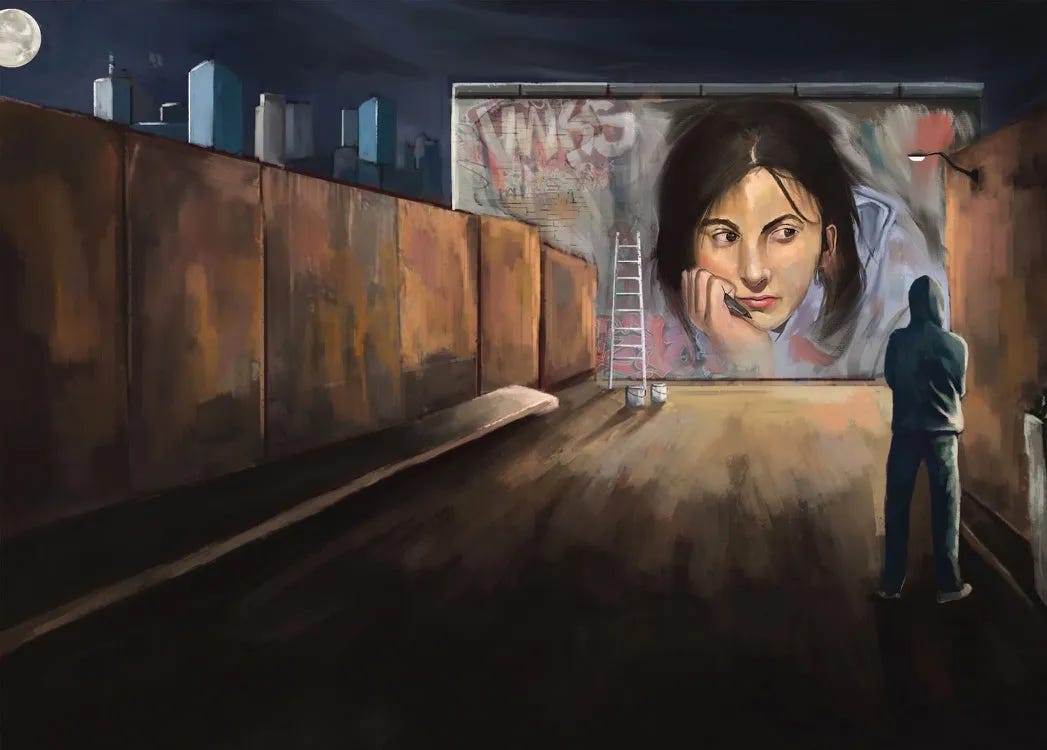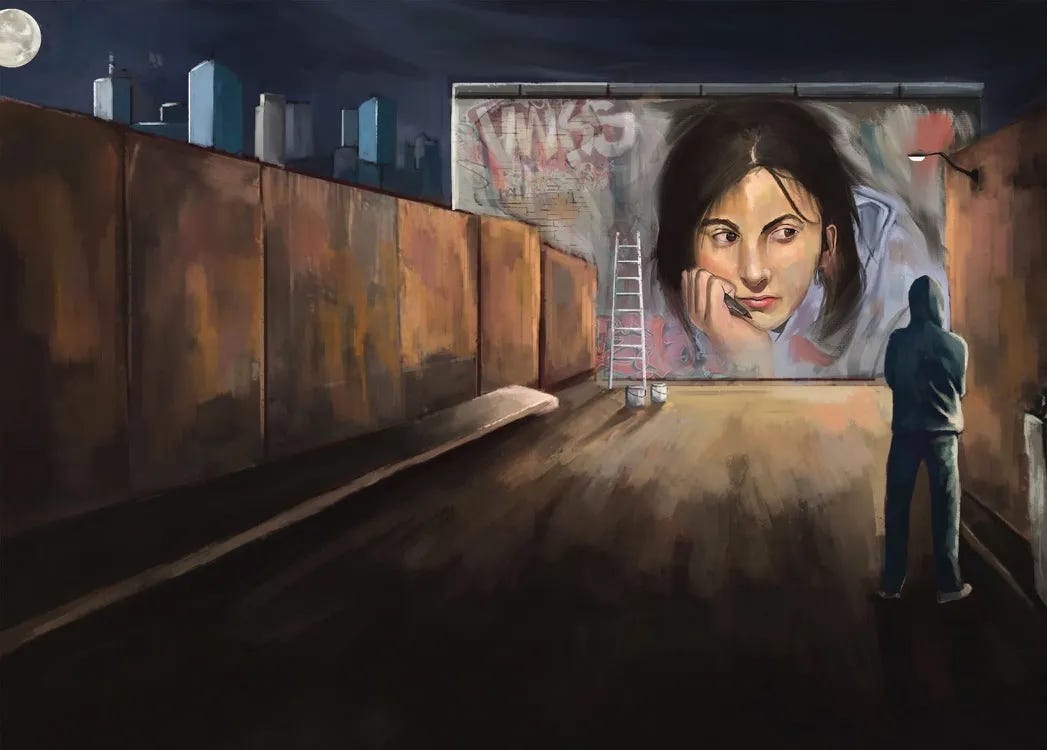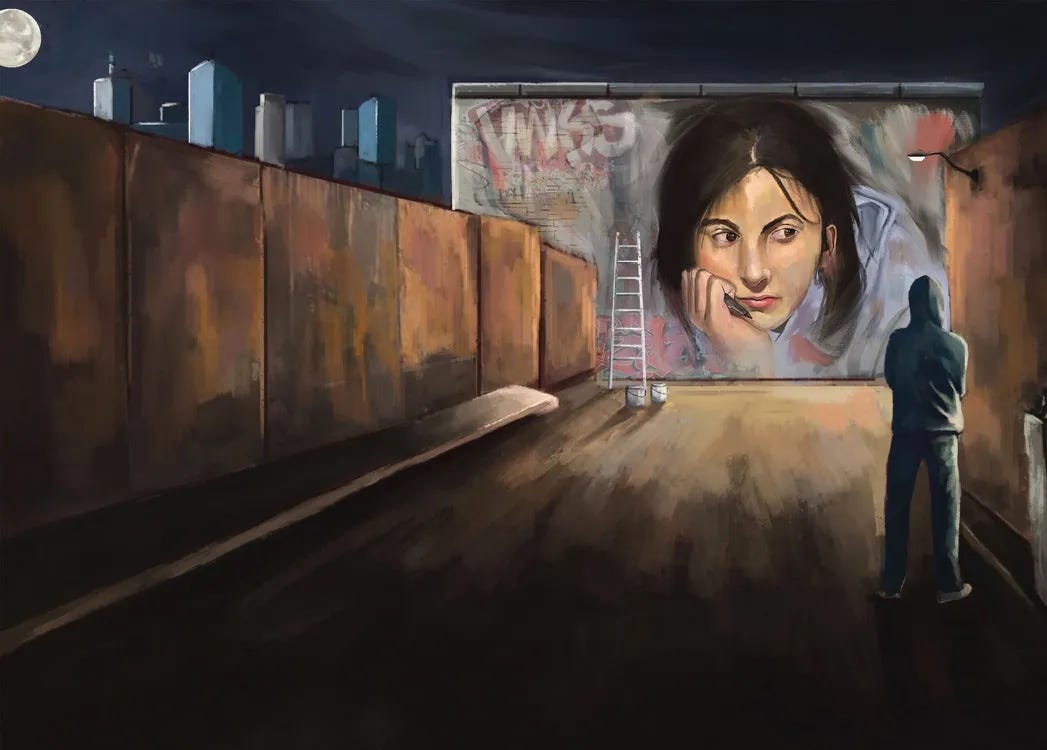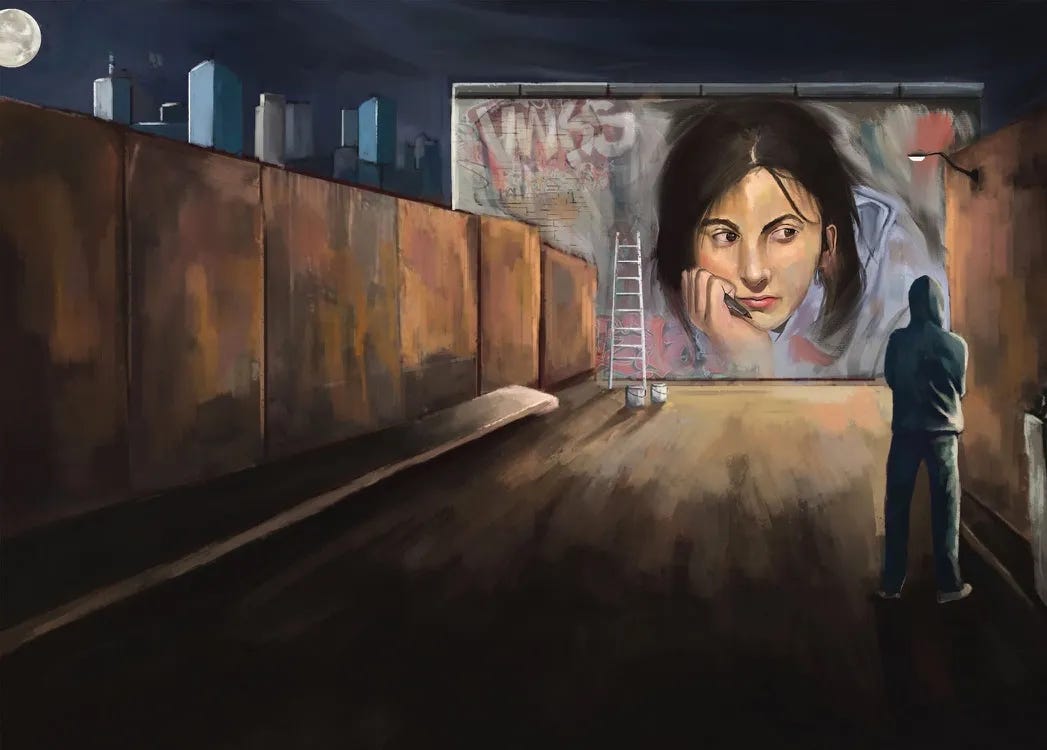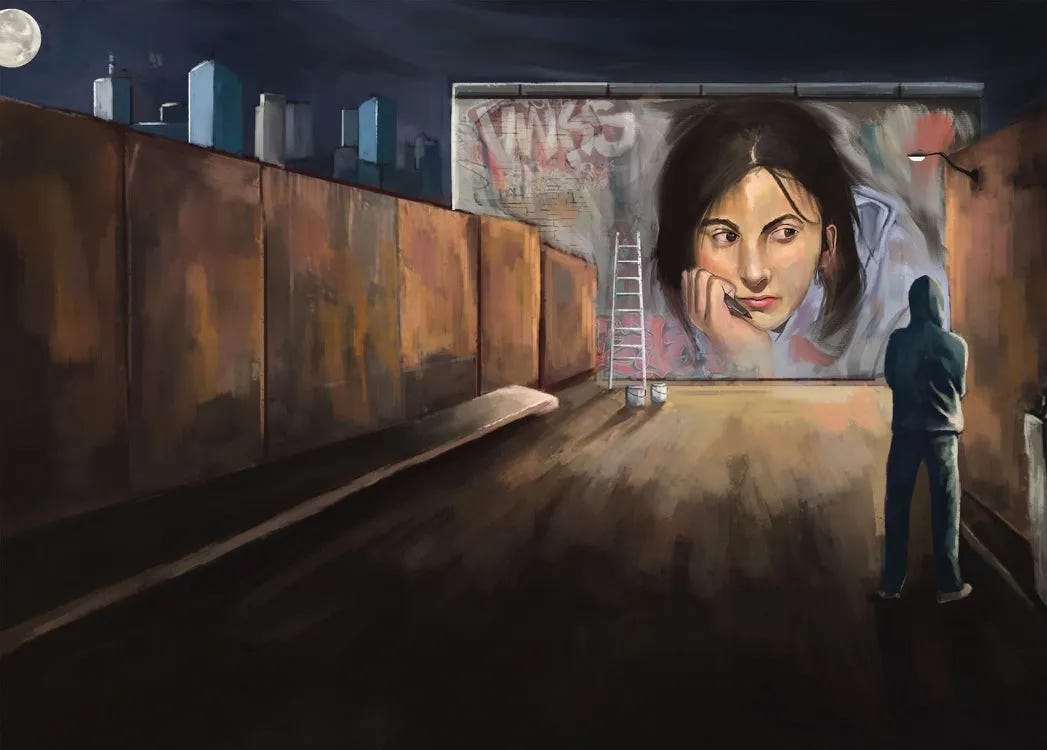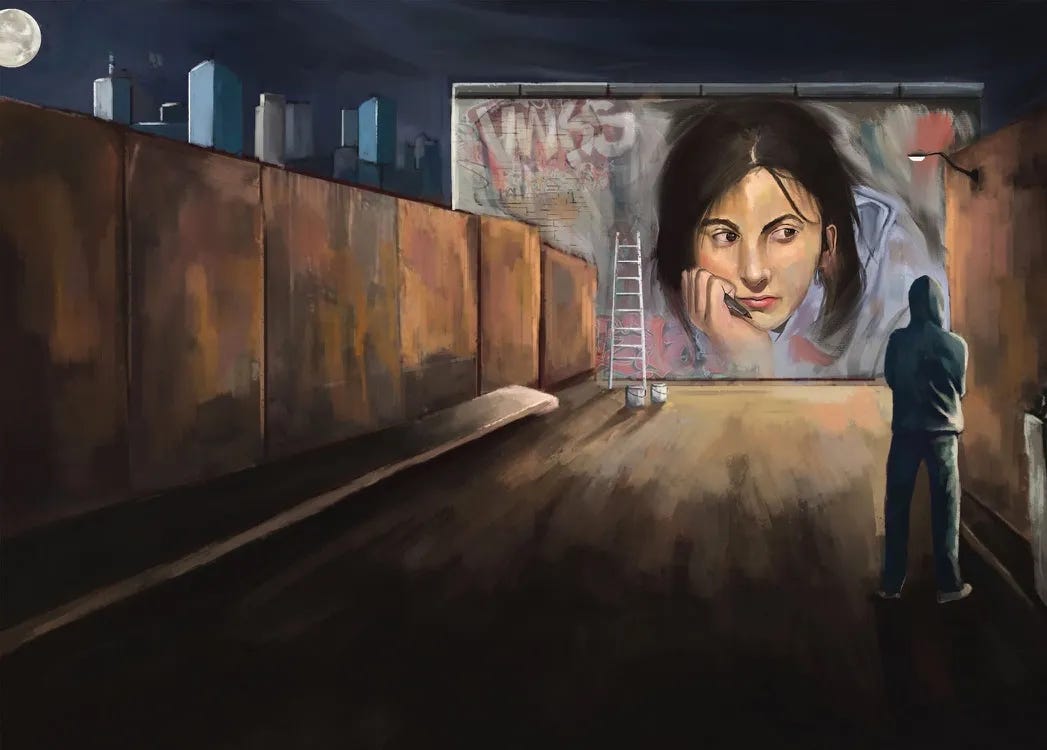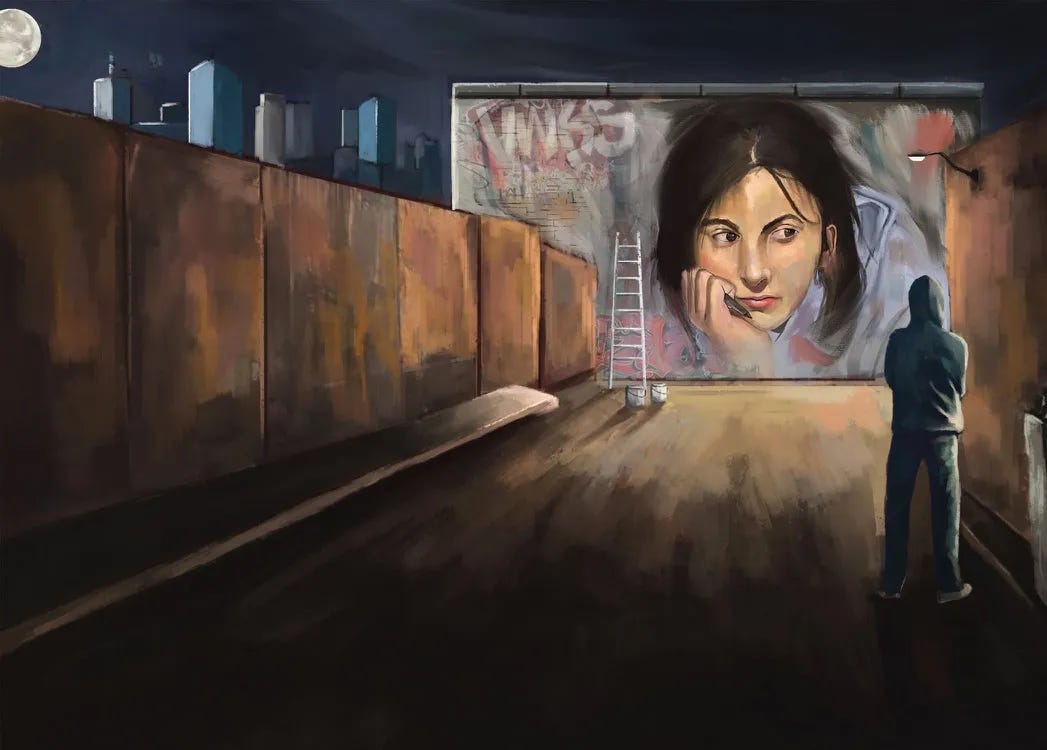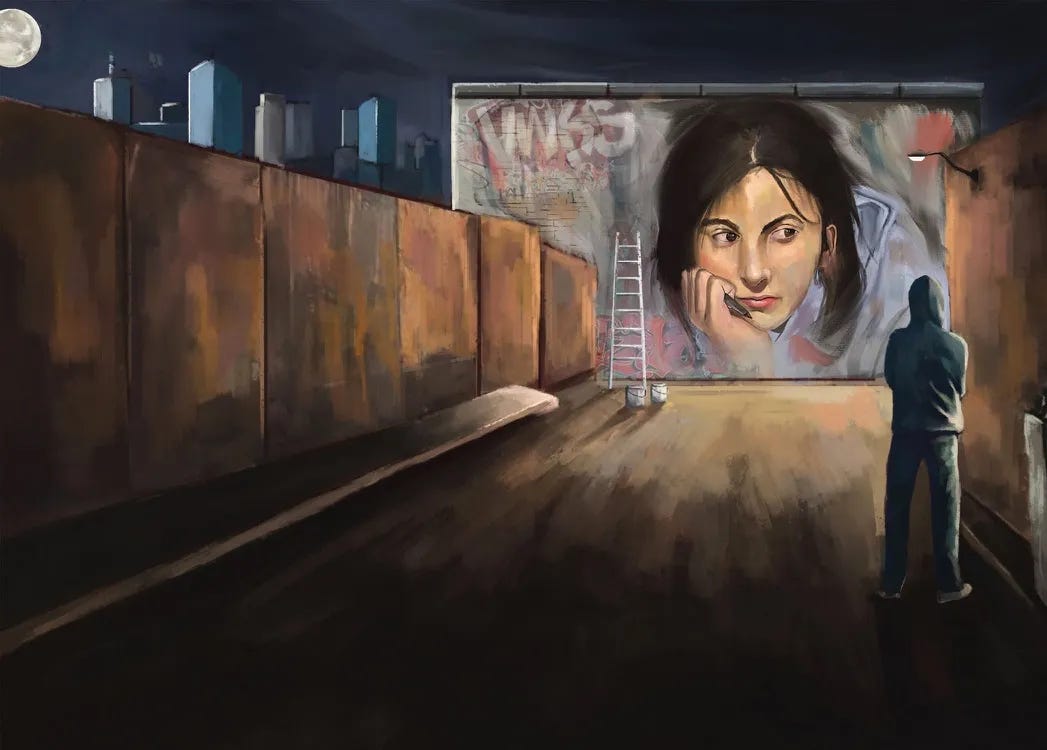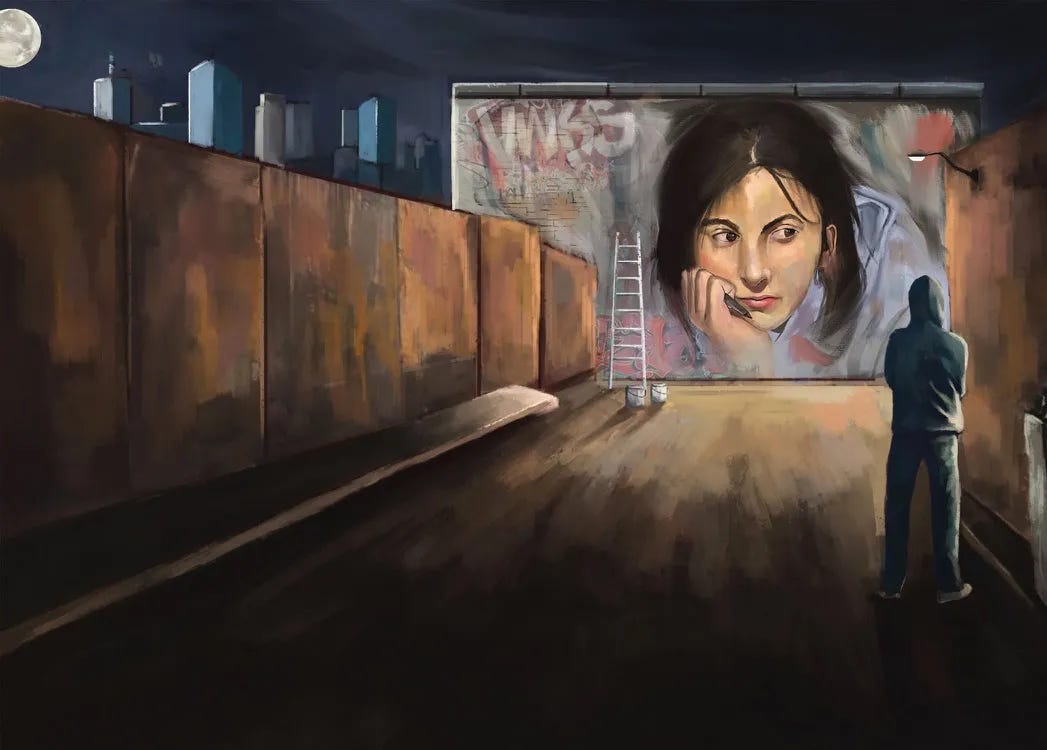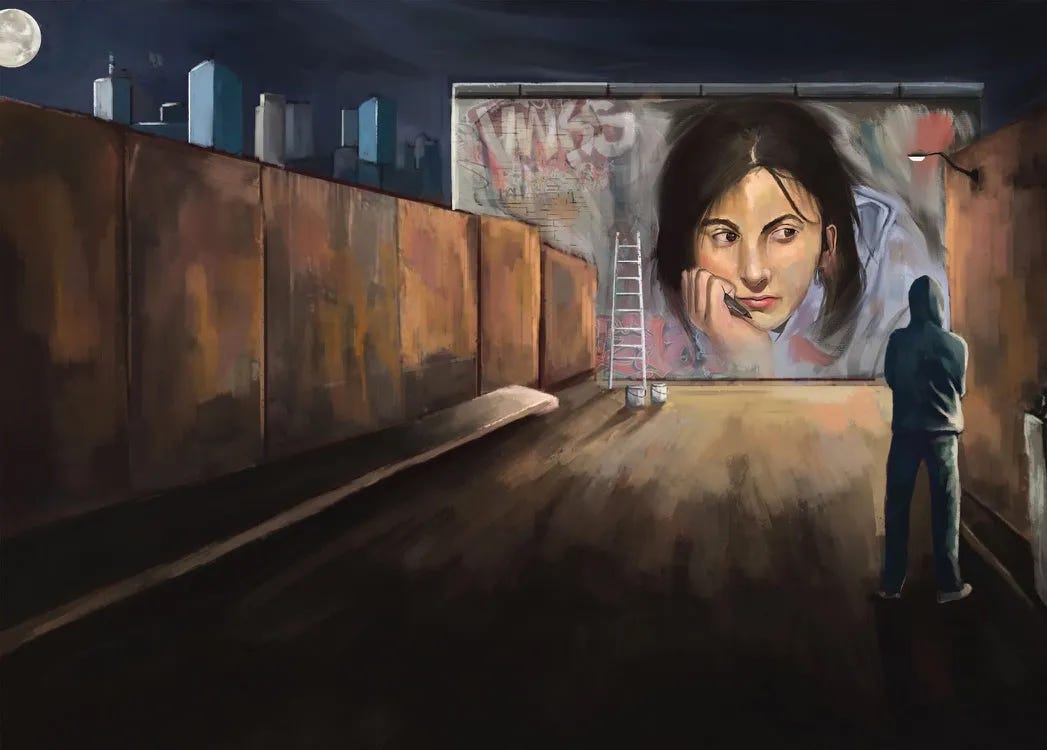
She must have then dozed for a bit, for when she opened her eyes, Zeph was stirring something over a new fire. Sitting on a stone near him were the two small bowls Zeph had pilfered. Each was filled with a steaming liquid. Each had a tea bag in it.
‘Zeph, is that really tea?’
‘It is,’ he said.
‘Tea bags? Here?’
He pointed to his backpack.
‘You’re full of surprises,’ she said.
‘I am.’
‘Zeph?’
‘Mmm?’
‘I’m sorry about last night.’
‘Forget it, it’s fine.’
‘No, it sounded like I was being critical. But I’m just so grateful. If it wasn’t for you at the pond, I’d be dead.’
He smiled his shy smile. ‘If it wasn’t for me and my door painting, you’d be with your family.’
‘If it wasn’t for you and your door painting, we’d be the midst of the Devastation. I’m glad we’re here.’
Zeph handed her one of the bowls. She noticed his golden thumb and forefinger. They glinted in the morning light. The tea had cooled enough to sip. Without milk, she was prepared for a bitter taste, but in fact the tea was sweet. Very sweet. It was delicious.
‘You have sugar?’
‘Some,’ he said.
‘Full of surprises,’ she said again.
They ate bread with the sweet tea and before long Harriet was feeling surprisingly refreshed.
‘Here,’ said Zeph when they’d finished their breakfast, ‘Try this on.’
He was pulling what looked like reams of green cloth from his backpack, but which she could now see were two green cloaks, filched (she presumed) from a house in the town. The cloaks had hoods, baggy three-quarter sleeves and were long enough to touch the knees.
‘And these too,’ said Zeph. He was now holding two pairs of loose fitting black trousers, and two pairs of leather slippers. Ten slightly awkward minutes later, and the two stood side-by-side, pleased and a little surprised by how well the stolen goods fitted, how much they now looked like any number of the folk they had seen at the town square, especially with the hoods up.
‘The brooch?’ said Zeph.
Harriet patted her thigh. She’d pinned it to the inside of the trousers.
‘I’m going to explore a bit,’ said Zeph. ‘I won’t be long.’
‘I want to come.’
‘I thought you could rest a bit more first. It might be another long day.’
‘Why don’t we just go back to the cove? It felt safe there.’
‘If we’re here to fulfil a prophecy, like that letter said, we’re not going to achieve much back at the cove.’
‘I want to come Zeph. I won’t relax if you leave me here on my own.’
‘Fair enough,’ said Zeph, and Harriet was soon following him along another of the forest’s animal tracks.
‘What are we looking for?’ she asked.
‘I’m not sure. I think we just have to see what’s here.’
‘You’ll know if there are … you know … bad spirits around?’
‘I think so. Or I did yesterday. No guarantees though.’
The animal track was narrow and Zeph soon had his new hatchet out, hacking away rather more than Harriet suspected was strictly necessary. He seemed to be enjoying himself, to be feeling in his element. Again she felt comforted.
As they walked, Harriet noticed the early autumn yellowing on the edges of some of the leaves. She tried to imagine how different it would look in the winter. Was this snow country, she wondered? Survival in a bare, blizzardy, slushy forest would be a very different kettle of fish.
They’d been walking through the thick forest for several hours when suddenly they came to a small clearing, at the far end of which they could see a steep rock face, lit up by the morning sun. In the middle of the clearing sat a huge boulder, round like a bowling ball, that no doubt had tumbled down the rock face in some long ago time and had come to rest near the entrance to a cave.
Zeph motioned for Harriet to crouch down, then made his way cautiously to the giant boulder. He paused, peered round the boulder and into the cave, then slowly approached the entrance. Again he paused and, with his hatchet at the ready, took a tentative step into the blackness. Then he was gone.
In the silence that followed, Harriet could feel her heart beat and her skin crawl. The forest seemed suddenly hushed, as if holding its breath. She willed Zeph to return. She tried to call out, but could not make her voice work. It was like a nightmare. She wanted to move, but felt riveted to the spot. Her body seemed to have detached itself from her brain.
Then, at last, she saw Zeph at the cave mouth. He motioned for her to join him, and, suddenly freed from her terror, she hurried across the clearing.
‘It’s perfect,’ he said. ‘But we must be careful.’
Harriet had a momentary impulse to hug Zeph, but he’d turned his back. She followed him as he stepped over an odd-looking indentation in the ground between boulder and cave entrance.
What she saw, once inside and her eyes had adjusted to the relative gloom, was that they were standing in a massive chamber, at least as wide as the school hall back at home, and much higher. It was surprisingly light inside, and at first Harriet thought she could see three spotlights fixed to the cave’s ceiling beaming down shafts of bright light through which dust particles drifted. But when she looked more closely she could see that in fact there were three small openings in the cave ceiling through which sunlight was pouring. The cave itself was dry and clean and the air was cool and fresh.
‘And look,’ said Zeph. ‘Down here.’
He pointed to the back of the cave.
‘Look Harriet,’ Zeph said again.
It was darker at the back of the cave, and at first Harriet couldn’t see where Zeph was pointing.
‘What is it?’ she asked.
Zeph was pointing at what at first glance seemed to be a large round rock over a metre high. But this was no ordinary rock. It was a natural well. And when she joined Zeph at the lip of the well and peered down into the blackness below, she could hear the bubbling of an underground stream.
‘Fresh water,’ said Zeph. ‘This is great! But we must be careful.’
‘Why?’
‘We’re not more than a day’s walk from the town,’ he said. ‘They’ll know about this cave, unless it’s just one of many in the area. Animals too. Did you notice the tracks leading to the cave mouth?’
She hadn’t. But what he was saying made sense.
‘We can shelter here if we have to. If the weather turns foul. And we can get water when we need it. But we shouldn’t stay here unless it’s absolutely necessary.’
‘But it’s a good base,’ said Harriet, disappointed though acknowledging to herself that again Zeph was right.
‘It’s perfect.’
Zeph suggested they collect fallen branches from outside and stack them at the back of the cave, behind the rock well, so that they would have a secure supply of dry wood. They spent the best part of an hour dragging sticks and branches of various sizes from outside. Then Zeph brought out his new toy, the hatchet, and set to work with relish, hacking away at the bigger boughs.
Then, at around noon, they reluctantly left their sanctuary and began to climb the steep slope above the cave, searching for a good place to camp for the night. It was not easy going. Harriet’s leather shoes lacked the grip of her sneakers, and her leg muscles, straining to compensate, tired quickly. She was relieved when, after scrambling for a hundred metres or so up the hill and still well short of the summit, Zeph pointed to a patch of flat ground.
‘Wait here,’ said Zeph. ‘Keep an eye out. I’ll get a fire going.’
Harriet sat on a rock, her head between her knees as she got her breath back. Her blisters throbbed. She was thirsty. She was in an unknown world and she’d very nearly died yesterday. She was on an impossible quest, and her grandfather and teacher were in some kind of danger. She had few survival skills and she had as a companion someone she hardly knew. She should have been terrified, or depressed, or despairing. But she wasn’t.
She actually felt oddly alive. Tired, sore, thirsty, wary, but aware of a tingling in her toes and in her fingertips, something other than the weariness and pain, something new and vital and kind of exciting. She’d never felt this sensation before.
Harriet looked back down the slope. She couldn’t see the cave mouth of course, but she could see most of the clearing. This was not only a good place to camp, but also a good vantage point. Zeph was right; the townspeople would know about the cave and its supply of fresh water. The two of them would be able to keep a lookout over the coming days. With any luck there would be no sign of human activity. With any luck they’d be able to make the cave into a more permanent base. She liked the idea of having a roof over her head.
But she was not unhappy about being out in the open. Especially given Zeph’s resourcefulness. He’d help them avoid danger, like at the pond. And she was reassured that the townsfolk didn’t seem like a warrior race. They were not unlike people she knew from her own world. Perhaps they might become allies. Perhaps they might help the two of them find this twice-dead woman and the seeds of resurrection.
This thought of the dead brought back to mind the face of the princess as she lay on the altar. So stunningly beautiful. How had she died, Harriet wondered. There was not a mark on her face, no sign of disease. It was an exquisite face without blemish.
Not for the first time, Harriet thought about death. She’d never really known her parents, but they were dead. What happened to that spark that animated their bodies and their minds, that life-force that was in them during their lives and had now gone? Did the life-spark just disappear? Did it live on in some other form? What would happen to Grandpa’s life spark when he died? To hers?
Ants were scurrying around near Harriet’s feet, small black seemingly harmless ants. Full of bustle. Full of restless life-spark. She imagined some kind of exchange system operating in the world, where the life-spark that left one life form at its death was transferred to another.
It was all so mysterious. But Harriet liked to think about these things. Some of her classmates recoiled when a conversation turned to death, but Harriet found their squeamishness strange. These big questions were so interesting. She didn’t want to die, of course, but she didn’t think she was frightened by it.
She thought again about how much she hated her science lessons at school. It should be such an interesting subject, science. But in her science classes the bigger questions were always avoided. They’d ‘do’ energy but never ask where it came from. They’d study the anatomy of the heart but never ask what caused the heart to pump in the first place. Or, if they addressed those questions, the answers would be so reductive, so mundane, so unsatisfying. It’s not that she wanted answers. No, it was more that she wanted to hear them acknowledge that there were mysteries involved that were beyond our capacity to comprehend. Instead the science teachers, or at least the ones she’d had, offered mechanical and unconvincing explanations for the ineffable.
Such a good word, ‘ineffable’. Grandpa had used it once and the two of them had discussed its meaning. She’d tried to use it often. Probably clumsily. But words were fun. And alive. Filled with life-spark.
‘Nice view.’
Harriet jumped at the sound of Zeph’s voice.
‘I was just thinking,’ she said. ‘Not really looking. But yes, nice view.’
She looked now. Being high up on the slope, the two could look down over the forest canopy.
‘That’s where the town is,’ said Zeph.
‘How do you know?’
‘The sun. It’s moving in that direction. That must be west.’
‘Where is the sea? The cove? Could you get us back to the cove do you think?’
‘Probably,’ said Zeph. ‘I think so.’
They ate the last of the bread. Zeph had also found some purple berries which were refreshing though bitter.
‘Not poisonous?’ asked Harriet before trying one.
‘No, they’re fine. I ate some. They’re fine. Just don’t eat too many.’
Harriet put one tentatively on her tongue, then chewed it slowly. It had a fresh piney, faintly lemony, taste.
‘Nice,’ she said. ‘Refreshing. A bit mouth-washy though.’
‘You’re right,’ said Zeph. ‘But better than nothing. I’ve got more in the back pack.’
‘Let’s save them. You never know.’
The afternoon wore on and Harriet dozed for a while. Zeph seemed to need little rest. When she opened her eyes after one nap, she saw that he’d caught, killed and was cooking a plump bird. A breeze was beginning to blow and there were feathers in the air. The bird’s head was in the billy and Zeph was roasting skewered bits of bird flesh.
Clouds had built up during the afternoon and towards sunset the first drops of rain fell. At first it seemed that it would come to nothing, but then they saw intermittent lightning flashes and heard the drumroll of distant thunder. From the high vantage point they could see the storm approach.
‘What about the cave?’ said Harriet.
Zeph was not sure at first. But when the rain began to slap against the rocks and the bushes began to thrash about, he signalled for them to pack up and head down the hill.
It was a difficult descent. The slope was soon awash and dangerously slippery, and both Harriet and Zeph had falls which became, for a panicky few seconds, out-of-control slides. The rain was now so hard, and the wind so strong, that it was difficult for them to hear each other, and there was a moment when Harriet doubted that they would make it without one of them breaking a limb. But make it they did, sliding the last few metres until they came to rest at the floor of the clearing.
Once she’d got her breath back and made sure that she had no major injuries, she looked over at Zeph sitting by her side. He was covered in mud. He too seemed to have escaped serious injury, though he was rubbing an ear and an elbow was bleeding. She attempted a smile and put a thumb up; even if she’d had breath enough to speak, there was no point in trying to talk as the air was full of the wind’s howl, the branches’ thrashings and the beat of rain on rock. Zeph returned her thumbs up and they both crawled past the huge boulder and into the welcome shelter of the cave.
There was rain coming into the cave from the three gaps in the ceiling, but now Harriet noticed the way each was feeding into natural gutters in the cave floor which joined up and whisked the rivulets down a channel into the bowels of the cave, leaving most of the cave itself dry. She guessed that somehow the rivulets would find their way to the underground stream.
Zeph fetched an armful of the dry twigs and sticks he’d collected in the morning. His matches he’d previously wrapped in plastic, and they had remained dry enough for him to scratch a flame. He soon had a comfortable fire going, the smoke escaping through the gaps in the cave’s ceiling. Zeph brewed tea. Neither was especially hungry, having had their fill of bird soup and roasted flesh on the hill earlier, but the tea was hot and sweet and good.
‘What now?’ said Harriet. She was aware of how often she asked Zeph to take the lead. It seemed natural, given his experience in fending for himself. Would she, she wondered, get better at this? She hoped so. But not yet.
‘We’ll have to stay here tonight, obviously,’ he said.
‘I’m glad,’ said Harriet.
‘No option. Even if it stopped raining, we’d never get dry out there. We need to keep warm. Let our clothes get properly dry. Don’t want to get sick.’
The thought of getting sick hadn’t occurred to Harriet. It wasn’t a good thought. She’d been shivering earlier; she’d hoped it was just the cold and wet.
‘We’ll sleep near the fire. Keep it going through the night if we can. Tomorrow, if the weather’s OK, we can return to the camp spot.’
The rain was drumming its relentless tune outside. But the wind seemed to have died down, and the thunder was more distant. Perhaps the worst of the storm had passed.
The fire was warm. Harriet lay down in the soft earth.
Sleep took hold almost immediately.
She woke during the night. Her sleep had been deep and the cave with its smouldering fire felt snug. Outside it was still raining, but more gently now. She could see Zeph’s sleeping face close by. His mouth was open, his breathing deep and regular. He had changed. He was no longer the lost, awkward boy she’d tried to make conversation with on the train. Was that only last week? It seemed like years ago. So much had happened. So much had changed.
Harriet reached over and picked up a handful of the dry sticks, then carefully placed them on the fire. There was a crackle and a spit of sparks, but Zeph didn’t stir. She watched the flames for a while, then drifted back to sleep.
When she opened her eyes, their fire was dead, the storm had gone and she could see, beyond the boulder at the cave entrance, the clearing bathed in bright morning sunshine.
But Zeph was no longer lying next to her.
She sat up quickly and looked deep into the cave. Though it was dark down there, she could see no movement.
‘Zeph,’ she called. Her voice sounded odd and echoey, not like her voice at all. ‘Zeph!’ she called again, more loudly this time. Had he gone?
But then she heard his voice.
‘Back here. Come and look.’
Harriet hurried to the back of the cave where she found Zeph bent over the hollow rock. He’d fixed one of the small bowls to the end of his rope, exactly how Harriet couldn’t tell in the dark, and he had fished up water from the stream which flowed below.
‘Here, taste this.’
Water had never tasted so good. It wasn’t just that she was so very thirsty after the previous day’s exertions, or that her limbs ached and the water seemed restorative in some deep way. It was the taste. Fresh, clean, clear, cold. As if distilled until every impurity had been eliminated. A kind of elixir.
‘Wow,’ she said. ‘That’s something else.’
She looked more closely at the contraption Zeph had made. He’d somehow woven one end of the rope so that it formed a small cradle into which the bowl snugly sat. It was simple, but again demonstrated Zeph’s resourcefulness.
‘Good work,’ she said admiringly.
Zeph then lent his elbows on the rock and peered down into the natural well. Harriet did the same from the other side, so that their foreheads were nearly touching. They could see nothing in the gloom down there, but they could hear the burble and splash of flowing water.
‘It makes a good sound,’ she said.
‘I wonder where it goes,’ said Zeph.
This was a new thought for Harriet. Of course. It must be on its way somewhere.
‘Some underground lake, perhaps?’ she said.
‘Maybe. Or maybe it comes out somewhere as a spring on the hill.’
‘Wouldn’t we see light down there if it was connected to the outside?’
‘Not necessarily. Not if there were bends. Or if the exit was a long way away.’
‘Zeph!’ she said suddenly. There was alarm in her voice. ‘Zeph, what’s that?’
‘What’s what?’
‘That sound?’ She was looking back towards the mouth of the cave. ‘It’s a human voice!’
And there it was again! A shout, like an order, coming from someone in the clearing.
‘Keep very still,’ whispered Zeph. They’d both instinctively taken cover behind the well, and were now crouched shoulder to shoulder.
Harriet now heard the slow, steady beat of a drum, and the tread of many footsteps. She peered round the edge of the rock. A shadow appeared at the cave entrance, next to the large boulder. It was the shadow of a man dressed in what seemed to be ceremonial robes. He was facing the cave, though with the bright morning light behind him, Harriet could not see his face.
‘O god of the underworld,’ she heard the man intone, ‘O guardian of the departed. Take care of our departed sister. Protect her as she takes her journey to join those who have taken the dark journey before her.’
And as he continued the prayer, the drum continued its doleful pulse.
These people were not passing by.
The shadow moved away from the entrance and, as the drum beat continued, four men – soldiers Harriet thought, as they had shields strapped to their backs and some kind of chain mail over their tunics – entered the cave. They were carrying on a bier the dead body of the princess. They moved as if hypnotised, in time with the beat of the drum.
They placed the body in the middle of the front chamber of the cave. Harriet felt her heart pounding. They were not far from last night’s fire. Were its embers still glowing? Would its lingering warmth give them away?
The four men stood a while with heads bowed and arms folded across their chests. Then, again to the beat of the drum, they walked backwards out of the cave.
The priest voice resumed.
‘And grant, o mighty god, a swift death to our brother here, who made his promise and must now face his ordeal.’
Oh no, thought Harriet, the bound man by the altar! She watched as he was pushed into the cave, his hands still tied but able to stagger. He slumped down sobbing next to the dead princess’s bier.
Two new men now entered carrying on trays various items which they placed at the foot of the princess.
‘Take these gifts,’ intoned the priest, ‘o unfortunate prince, and may they lighten your suffering in the coming dark days as you pay the promised price.’
The drum beats suddenly ceased. All was still. The bound man moaned. The two servants were gone, though Harriet had not seen them leave.
And then there was a shout, an order given by some officer of the guard. Footsteps, many of them, ran towards the cave entrance. More orders, followed by the grunts and strain of mighty effort. Side drums began a prolonged drum roll. The officer’s orders became more urgent.
They were pushing the boulder across the entrance.
More shouted orders, more cajoling and grunting and heaving. And then it was done. Only the thinnest band of light was visible as the boulder was finally pushed into place. A brief shout of triumph. The drum beat ceased. Harriet heard, above the thudding of her frightened heart, a final order.
And then silence.
She felt Zeph’s hand on her shoulder. She shut her eyes.
They were trapped in a cave with a dead body and a stranger.
The only sound, the bubble of the water at the bottom of the well. And then a shuffling.
Harriet opened her eyes and peered around the well’s wall. It was darker inside now, much darker, though there was still enough light from the three ceiling gaps for her to see the bound man.
He was crawling towards the closed cave entrance. She saw him push desperately and uselessly, his shoulder to the boulder, then heard him again moan. He started to hit his head rhythmically against the immoveable boulder, and then he slumped to the floor, whimpering.
‘What now?’ Zeph whispered.
This sudden reversal of roles had an affect. Harriet found herself thinking, preparing to act.
‘You there,’ she shouted.
The man froze mid-moan.
‘You’re not alone. We mean no harm. We’re here to help.’
Harriet had no idea where she was going with this. It just felt like the right thing to say.
Zeph clearly felt the rightness of it. ‘We’ve got water for you,’ he called out as he struck a match.
The man turned towards their voices. Perhaps he could see the lighted match.
‘Who are you?’ His voice was thin, tentative, weedy.
‘Friends,’ said Harriet.
She stood and took some steps towards the slumped figure. He looked so helpless. Harriet could now see that it was not just his hands that were tied; a rope held his arms tightly pinioned. She could not see his face clearly from this distance, but heard the uncertainties, the struggle between fear and hope, in his voice.
‘We’re trapped too,’ said Harriet. Perhaps this would help him see them as allies rather than as spirits from some other world. ‘We’re here together now.’ She walked slowly towards him as she spoke. ‘Let me get rid of the rope that binds you.’
Harriet bent down and began to fumble ineffectually with the rope. She heard a sharp intake of breath from behind her as Zeph’s match burnt a finger and then went out. But there was light enough in this main chamber, and soon Zeph was tugging at the rope and freeing the frightened man, who was peering first at Harriet and then at Zeph, seemingly teetering between fear and relief.
‘Who are you? What are you doing here?’ he said.
‘It’s a long story,’ said Harriet. ‘For later. I’m Harriet, he’s Zeph. Zeph, do you think we three could move the boulder?’
‘No way,’ he said. ‘You saw how many it took to shove it into place.’
She turned to the bound man. ‘What supplies did they bring, those servants?’
‘I’m not sure,’ said the man.
Zeph went to the foot of the bier, where a canvas bag lay. Four candles. Four loaves of bread. Four bottles of wine.
The man was now drinking water from the bowl that Harriet had fetched. His breathing was slowing. He seemed calmer.
Harriet, though, was trying not to think about the fourth occupant of the cave.
Zeph rekindled the fire. They opened one of the bottles of wine (each had been sealed with a wad of cloth) and ate some of the bread. The wine was strong and calming. The bread was heavy but welcome. For a while they ate and drank in silence. Harriet wondered if the wine would make her drunk. She was trying to convince herself that their slow deaths in this dark place could be avoided.
‘Tell us what’s going on,’ said Harriet at last. ‘What’s all this about, you in here. And her.’
The young man – his name, he told them, was Stilwell – told his story. He’d been the son of a struggling farmer, too poor to support a family for long. He’d joined the king’s army as a result, and had, rather by accident, distinguished himself in a battle. Had in fact saved the day. The king had been grateful and granted Stilwell land and a title in a grand ceremony at the palace, and there he had been introduced to the princess. Why, he later asked various courtiers, was she not married? ‘She’s strange,’ he’d been told. ‘Unpredictable. She’s had suitors in the past of course, many of them, but she’s said she’d only marry someone prepared to be buried with her if she should die first.’ Electrified by the princess’s beauty, and convinced that fate had presented him with an opportunity it would be shameful to refuse, Stilwell had agreed to the conditions and had been accepted. But after the wedding the princess had fallen ill, had died, and … well … here he was.
‘Is this really true?’ Harriet asked.
He nodded. ‘Yes, all of it. Here I am. This is my fate. But you two. Who are you?’
And so Harriet told him the story. Or at least most of it. She said nothing, of course, about another world or a ruby brooch, instead talking vaguely about their ship foundering and them swimming to shore.
The three continued to sip from the bottle as they finished telling their stories and each began to notice a welcome drowsiness. For a while they sat quietly, looking at the flames, letting their thoughts drift.
Then they dozed.
Harriet must have slept deeply, if only for a minute or two. As she opened her eyes, aware only of a slight fuzziness in her head, she was wondering vaguely if she were still in her room at home. But she could smell the piney smoke from their fire. She could see Zeph’s gentle face in repose. She saw Stilwell slumped nearby. And then she remembered. She looked over at the bier and the blocked cave mouth and felt their doom as heaviness in her chest.
She relit a candle they’d snuffed out once they’d got the fire going, and approached the still form on the bier. As if to force herself to face the worst, she brought the candle above the dead woman’s head and looked at the princess’s face.
There were no signs of putrefaction. The face was perfect, like a milk-white marble carving. Harriet had seen faces like this in art books. She was reminded of the story of Helen, she whose face was said to have launched a thousand Greek ships.
There were two small golden coins, one placed on each of the princess’s closed eyes. Harriet reached over and lightly touched the lips. They were as cold as stone.
‘What are you doing?’ It was Zeph, at her elbow.
‘She’s beautiful, isn’t she.’
‘She is.’
‘And dead.
‘Yes, dead.’
‘Zeph, we will be dead soon.’
‘Do you think?’
‘Well, don’t you?’
‘Maybe. Maybe not. We shouldn’t give up hope. That would be the end.’



